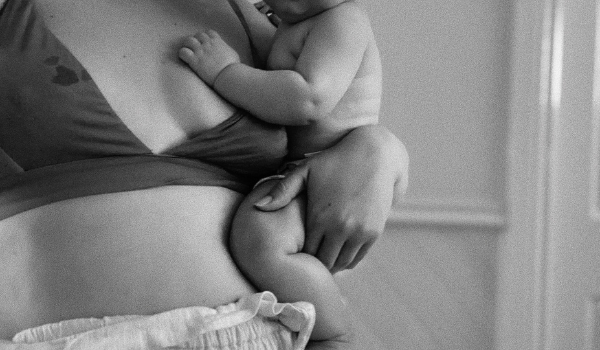Pregnancy places an enormous toll on a mother’s body. Morning sickness─fatigue─swollen ankles─aching pelvis─insomnia. (Or perhaps you are enjoying thick, shiny hair and glowing skin). Irrespective, as your baby grows, so too do your needs. And, if we do not support this growth, the result is one incredibly depleted mother struggling with ‘baby brain’, debilitating fatigue, insomnia, thinning hair, dry, loose skin, and sensitivity to light and sound─all of which increases her risk of postpartum depression.
When talking about postpartum depletion, we must first consider the role of the placenta
The placenta is the communication axis between mother and baby. During pregnancy it acts as a filter to protect the baby against toxins. It is a hormone command centre, producing high levels of hormones not only for baby’s growth, but to actually upgrade the mother’s brain with emotional reasoning, intelligence and sensitivity–all of which allow her to respond to her baby’s needs. And, the placenta functions as a sensor, regulating the absorption of nutrients, oxygen and amino acids to ensure the baby is receiving everything they need. [1]
The problem we face is that placental health can be impaired–by nutritional depletion, by exposure to endocrine-disrupting chemicals, by carrying too much weight, by high stress, and by illness. [2-3] What we must also consider is that after birthing the placenta, there are huge hormonal fluctuations─oestrogen levels drop a whopping 95%; progesterone levels drop to nearly zero within 48 hours; and corticotropin-releasing hormone (which facilitates cortisol productions) also plummets. This combination of suboptimal placental health during pregnancy and huge hormonal fluctuations postpartum does nothing but push a mother to her most depleted state. [1]
3 Steps to Prevent Postpartum Depletion
1. Analyse and optimise nutritional status during pregnancy. Supporting iron, iodine, vitamin B12, folate, vitamin D, zinc, magnesium, and DHA levels during pregnancy is key in promoting a healthy postpartum. Why? Because collectively, these nutrients are required for both mother and baby’s digestive, immune, endocrine, neurological, and hormonal health. For example, iron deficiency during pregnancy is strongly linked with postpartum depression [4] As is DHA–and what we know about this omega-3 fatty acid is that in the third trimester, baby’s brain undergoes rapid growth and requires 50-70 mg of DHA per day. If the mother does not receive an adequate amount of this nutrient, her energy, mood and mental clarity are compromised.[5] We also know that women with low vitamin B12 status during pregnancy are 4.53 times more likely to develop postpartum depression.[6]
2. Prioritise exercise during pregnancy A recent systematic review and meta-analysis of 93,676 women found that those who were physically active during pregnancy had reduced rates of postpartum depression. We cannot discount the importance of regular exercise–it improves beta-endorphins levels, reduces pain, and supports healthy levels of neurotransmitters (serotonin, dopamine, noradrenaline); all of which are associated with improved mood, enthusiasm and feelings of satisfaction. They key to exercising is to do something you actually enjoy.[7]

